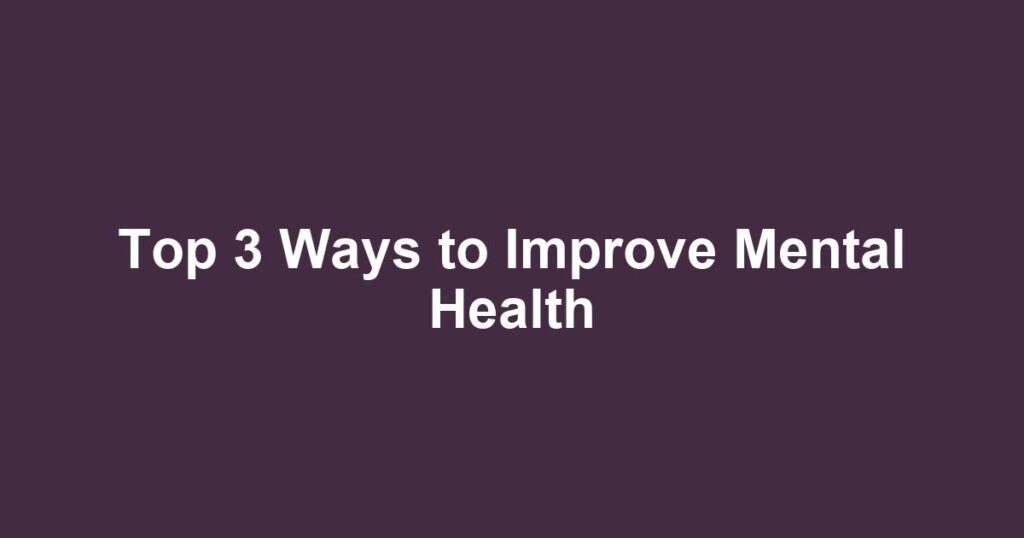Top 3 Ways to Improve Mental Health
In today’s fast-paced world, prioritizing mental health has never been more important. Mental health impacts every aspect of our lives, from relationships to workplace productivity. Fortunately, there are various effective strategies you can adopt to boost your mental well-being. In this article, we will explore the top three ways to improve mental health, focusing on practical tips and self-care strategies that you can incorporate into your daily routine.
Understanding Mental Health
Before diving into the strategies, it’s essential to understand what mental health is. Mental health encompasses our emotional, psychological, and social well-being. It affects how we think, feel, and act and plays a crucial role in determining how we handle stress, relate to others, and make choices. Good mental health is vital for a fulfilling life, yet many people struggle with it at some point. This leads to the question:
What causes mental health issues?
Mental health issues can stem from various sources, including:
- Genetics and family history
- Life experiences, such as trauma or abuse
- Biological factors, like brain chemistry
- Environmental stressors, like work or school pressure
With this understanding, let’s delve into three effective methods for improving mental health.
1. Practice Mindfulness and Meditation
Mindfulness and meditation are powerful self-care strategies that can significantly enhance your mental health. By focusing on the present moment, you can reduce anxiety and improve emotional regulation. Here’s how to incorporate these practices into your daily life:
How to Practice Mindfulness
- Start with your breath: Take a few minutes daily to focus solely on your breathing. Inhale deeply, hold for a moment, and exhale slowly. This can ground you in the present.
- Engage your senses: Pay attention to the sights, sounds, and textures around you. This heightens your awareness and promotes relaxation.
- Observe without judgment: When thoughts arise, notice them without labeling them as good or bad. This detachment can reduce their power over your emotional state.
Benefits of Meditation
Meditation can provide substantial benefits, such as:
- Reduced stress and anxiety levels
- Improved focus and concentration
- Enhanced emotional well-being
Consider starting with guided meditation apps like Headspace or Calm to ease into the practice.
2. Foster Meaningful Connections
Building and maintaining interpersonal relationships are crucial for mental well-being. Social connections can provide support, reduce feelings of isolation, and contribute to happiness. Here’s how you can cultivate meaningful connections:
How to Foster Relationships
- Reach out to family and friends: Make an effort to connect with loved ones regularly. A simple text or phone call can go a long way in reinforcing bonds.
- Join community groups or clubs: Participating in activities aligned with your interests can introduce you to new friendships and strengthen your social network.
- Volunteer: Giving back to your community not only helps others but allows you to meet new people and create a sense of belonging.
Why Does Social Connection Matter?
Studies consistently show that people with strong social ties tend to have better mental health outcomes. Such connections can provide:
- Emotional support during difficult times
- A sense of purpose
- Increased feelings of self-worth
By investing time and effort into these relationships, you can create a supportive environment that fosters your mental health and well-being.
3. Prioritize Self-Care Activities
Self-care strategies are essential for maintaining mental health. They allow you to recharge, boost your mood, and develop a more positive outlook on life. Here are some self-care strategies to consider:
Practical Self-Care Strategies
- Get enough sleep: Aim for 7-9 hours of quality sleep each night. A regular sleep schedule and a relaxing bedtime routine can improve your mental clarity and overall mood.
- Exercise regularly: Physical activity releases endorphins, chemicals in your brain that act as natural mood lifters. Try to engage in at least 30 minutes of moderate exercise most days of the week.
- Maintain a healthy diet: Eating a balanced diet rich in fruits, vegetables, lean proteins, and whole grains can positively influence your mood and energy levels.
- Engage in hobbies: Make time for activities that bring you joy, whether it’s painting, gardening, or playing an instrument. This can serve as a productive outlet for your emotions.
Why is Self-Care Vital for Well-Being?
Self-care enables you to take control of your health and well-being. Prioritizing self-care can lead to:
- Improved self-esteem and self-worth
- Enhanced resilience in the face of stress
- A more balanced life
Conclusion
Improving mental health requires consistent effort and engagement. By incorporating mindfulness and meditation, fostering meaningful connections, and prioritizing self-care into your daily routine, you can significantly enhance your mental well-being. Each step you take towards better mental health contributes to a happier, healthier life.
What’s holding you back from taking these steps? Remember, you don’t have to do it all at once. Start by choosing one strategy that resonates with you and gradually build upon it. Your mental health deserves attention, so take action today!
Call to Action
If you found these tips helpful, share them with a friend or family member who might also benefit. Your journey to improved mental health starts now—take the first step!
Meta Description: Discover the top 3 ways to improve mental health with practical well-being tips and effective self-care strategies. Start your journey today!

